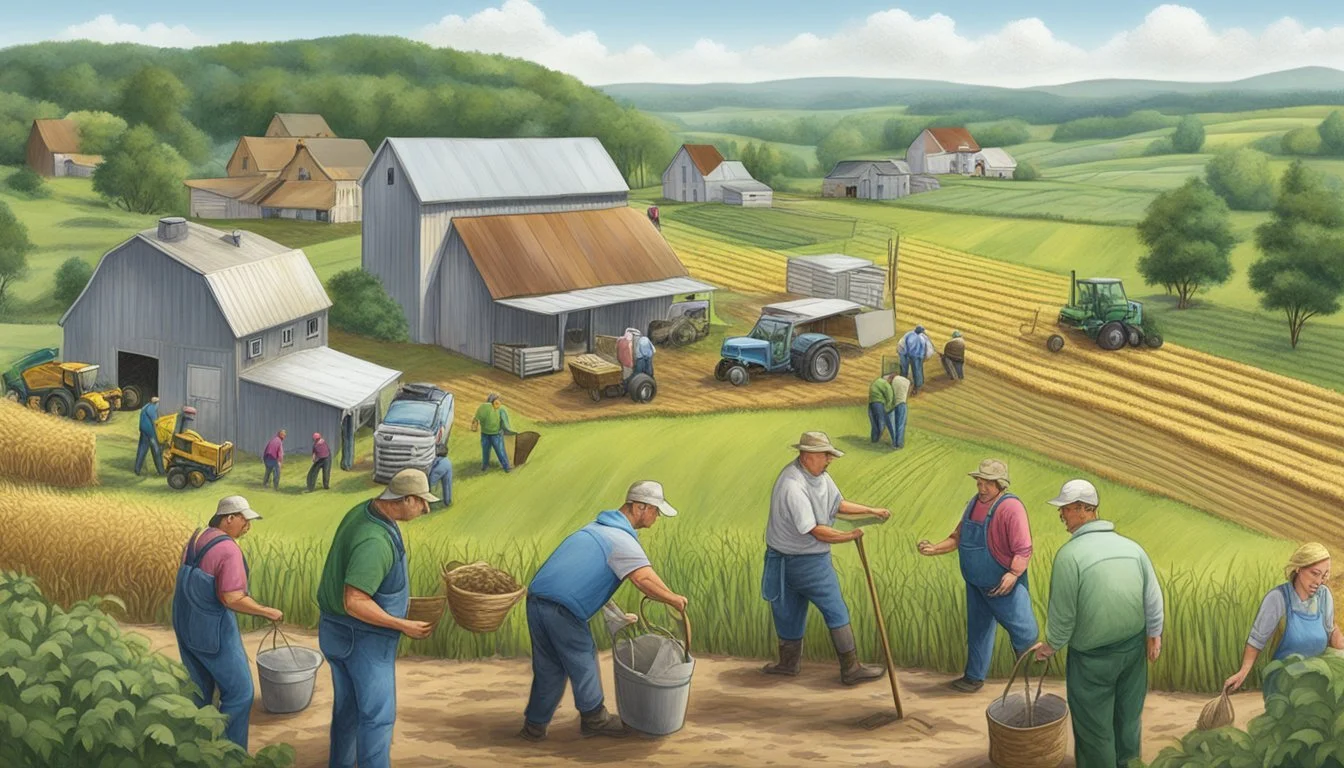Farming Grants Pennsylvania
Navigating Funding Opportunities for Agriculturists
Agricultural enterprises and businesses in Pennsylvania have access to a range of funding and grant opportunities designed to bolster farming practices and sustain the industry's economic viability. These grants serve as a key resource for farmers, providing financial assistance for a variety of initiatives aimed at enhancing productivity, implementing sustainable methods, and expanding market reach. With the Pennsylvania Department of Agriculture managing several Reimbursement Grant programs, farmers have the chance to recover a portion of the expenses incurred from agricultural projects. Such grants, while available for limited periods and often tied to specific activities, can be crucial for the continuity and growth of farming operations across the state.
Pennsylvania's farming sector, which includes over 53,000 farms, is a cornerstone of its economy, contributing significantly to job creation and economic output. Recognizing the sector's influence, the state takes strategic steps to invest in agriculture, ensuring it remains a robust economic driver. The Farm Vitality Grant, for example, sets aside budget allocations of up to $200,000 for the 2022 - 2023 Fiscal Year to support farming endeavors—a testament to the state's commitment to strengthening its agriculture legacy. These grants, requiring a cost-sharing approach, encourage farmers to invest in their enterprises while providing aid that dims the financial burden.
Partnerships and cooperation with local USDA representatives can be instrumental for farmers seeking competitive grants. Working with agricultural specialists, farmers are better positioned to navigate the complexities of funding applications and make informed decisions. The multifaceted assistance offered through these programs underscores the state's support for its agriculture sector and its intent to cultivate a thriving, sustainable farming environment throughout Pennsylvania.
Understanding Farming Grants in Pennsylvania
In Pennsylvania, the Department of Agriculture offers financial support to farmers through various grant programs. These grants aim to bolster agricultural operations by easing the financial burdens associated with farming projects and improvements.
Types of Grants Available
Farm Vitality Grant: This grant program supports the planning stages of farm projects with funds up to $200,000, covering expenses incurred from July 1, 2022, for up to two years after the grant agreement's effective date.
Planning and Working Capital Grants: Initiated in two phases, applicants can receive a planning grant of up to $75,000 and then apply for working capital grants with a maximum value of $250,000. Both phases necessitate a 50% match from the recipient.
Urban Agriculture Grant: Aimed at urban agricultural projects, this grant caps at $2,500, funding up to 85% of total project costs, thereby requiring applicants to match the remaining 15%.
Eligibility Requirements
General Eligibility: Applicants should be current residents of Pennsylvania, and specific grants may have age restrictions (for instance, applicants must be at least 18 years old for the Next Generation Farmer Loan Program).
Matching Funds: For certain grants, applicants are required to provide matching funds. For example, the planning and working capital grants necessitate a 50% match from the awardee.
Scope of Project: Eligibility is often tied to the nature of the agricultural operation and the details of the project. Eligible expenses typically include costs incurred after the start date specified in the grant agreement.
Grant programs are designed to support a wide range of initiatives and are subject to specific terms and conditions set forth by the Pennsylvania Department of Agriculture. Farmers interested in these opportunities should review the individual grant details for a comprehensive understanding of the application process and requirements.
The Application Process for Grants
When applying for farming grants in Pennsylvania, applicants must adhere to strict deadlines, provide comprehensive documentation, and meet specific selection criteria. Each grant program has unique requirements, often stipulating business planning and financial management tools.
Application Deadlines
Each grant offered through the Pennsylvania Department of Agriculture has its own application deadline. Prospective applicants are advised to check the respective grant's webpage for the most current deadline information. Missing a deadline typically disqualifies the application until the next submission cycle.
Required Documentation
Applicants should be prepared to submit the following documentation:
Income Statement: A clear indication of the farm's financial performance.
Cash Flow: Documentation reflecting the movement of funds in and out of the business.
Balance Sheet: An overview of the business assets, liabilities, and equity.
Business Planning Services: Evidence of professional assistance in drafting a business plan, critical for demonstrating the farm's future sustainability.
Selection Criteria
Grants are awarded based on several factors, including:
Relevance to Program Goals: How well the proposal aligns with the grant's objectives.
Financial Need: Demonstrated need for financial support to ensure the success of the business.
Prospective Impact: The expected outcomes or benefits of the funded project.
Applicants should note that for some programs, such as reimbursement grants, they may be required to front the costs and seek reimbursement later, which underscores the importance of sound financial planning.
Financial Assistance and Loan Programs
Pennsylvania farmers have access to a variety of loan and grant programs designed to support the agricultural industry. These financial assistance options can help with everything from operating costs to land purchases.
USDA Farm Loan Programs
The United States Department of Agriculture (USDA) offers several Farm Loan Programs to assist farmers. Notable among these are:
Operating Loans (OL): These loans provide farmers with the necessary funds to cover their daily operating expenses.
Farm Ownership Loans (FO): Assistance for farmers looking to purchase or expand their farms.
Microloans: A subsection of both OL and FO, microloans offer smaller, more accessible financing options for new and disadvantaged farmers.
Pennsylvania-Specific Loan Programs
The state of Pennsylvania provides its own suite of loan programs for farmers:
Next Generation Farmer Loan Program: This initiative offers reduced interest rates through federal tax-exempt financing for capital purchases like farm land or equipment.
Farm Vitality Grant Program: Through the Pennsylvania Department of Agriculture, farmers can apply for grants to support strategic planning for their operations, with a funding pool of up to $200,000 for the fiscal year 2022-2023.
Farmers in Pennsylvania are encouraged to investigate both federal and state programs to find the best financing solutions for their needs.
Conservation and Land Management
Pennsylvania offers a variety of grants designed to support conservation efforts and land management practices. These initiatives are essential for preserving the state's natural resources, including wildlife habitats.
Conservation Grants
Conservation Excellence Grant (CEG) Program: This is a state-funded initiative under Act 39 of 2019 that provides financial and technical assistance to farmers for implementing best management practices (BMPs). The program prioritizes agricultural operations in high-need areas to enhance conservation efforts.
Essential Info:
Funded by: Pennsylvania Department of Agriculture
Goal: Support BMPs for Conservation
Eligibility: Agricultural operations in high-priority areas
Conservation Innovation Grants (CIG): These competitive grants are offered to stimulate public and private sector innovation in resource conservation, including promoting new technologies and strategies to address challenges in agriculture and land management.
How to Apply:
Contact: Pennsylvania's Natural Resources Conservation Service
Procedure: Submit a competitive proposal
Land Stewardship Initiatives
Conservation Stewardship Program (CSP): Administered by the USDA Natural Resources Conservation Service, CSP assists landowners in sustaining and improving their agricultural and forestry land. It focuses on long-term stewardship commitments and encourages practices that protect soil, water, and wildlife habitat.
Key Benefits:
Enhances: Soil quality, water management, and wildlife habitat
Supports: Long-term conservation strategies on agricultural land
Environmental Quality Incentives Program (EQIP): EQIP offers financial and technical assistance to agricultural producers to help plan and implement various conservation practices. This program is vital for addressing natural resource concerns and improving environmental quality on agricultural land and livestock operations.
Program Highlights:
Assistance Offered: Financial and technical
Objective: Improve agricultural environmental quality
The agricultural community in Pennsylvania has access to several programs that strive to balance the demands of agriculture with the necessity of conserving precious natural resources. These initiatives enable farmers to contribute significantly to land conservation and natural resource management, ensuring the sustainability and health of Pennsylvania's diverse landscapes.
Education and Training Resources
Pennsylvania offers an array of resources aimed at educating new and established farmers, enhancing their skills, and promoting urban agriculture. Through Penn State Extension and various workshops, participants gain hands-on experience and valuable insights into sustainable farming practices.
Extension Services and Workshops
Penn State Extension plays a critical role in educating Pennsylvania's agricultural community. It provides research-based training and resources to all levels of farming professionals. New farmers can particularly benefit from the depth and breadth of knowledge available. The Extension's offerings include:
In-person workshops: Covering topics from crop and livestock management to marketing and financial planning.
Online courses: For accessibility and convenience, especially for part-time farmers or those in urban settings.
Demonstration farms: Allowing participants to observe and learn from real-world applications of farming techniques.
Urban agriculture initiatives are recognized within these programs, reflecting the state's commitment to addressing diverse farming environments and the unique challenges faced by urban farmers. Through education and training resources, Pennsylvania empowers its farmers to innovate and succeed in a changing agricultural landscape.
Support for Specialty and Niche Farming
Pennsylvania offers targeted support programs for farmers focusing on specialty and organic crops, as well as assistance tailored to the needs of livestock and dairy producers. These initiatives are designed to enhance the competitiveness and sustainability of niche sectors within the state's agriculture industry.
Organic and Specialty Crop Support
The Commonwealth administers the Specialty Crop Block Grant Program, aimed at fostering the specialty crops sector. Specialty crops include an array of produce such as fruits, vegetables, tree nuts (how long do nuts last?), dried fruits, and horticulture. This program supports projects that can boost the market for crops like honey and hops, which are vital for Pennsylvania's growing craft brewing industry, as well as other organic options. Grant awards are available for a wide range of projects without minimum or maximum grant limits, however, they operate on a reimbursement basis.
Eligible projects may include:
Market promotion and access enhancement
Research and development of new agricultural practices
Establishing organic operations in response to growing consumer demand
Support for Livestock and Dairy Producers
Livestock and dairy production, core components of Pennsylvania's agricultural economy, receive support through various state funding efforts. The state's programs recognize the unique challenges faced by these producers and provide financial assistance to promote sustainable growth and innovation in their practices.
Funding can be utilized for:
Upgrading equipment and technologies
Implementing superior animal health and welfare practices
Expanding into niche markets such as specialty dairy products
These grant and funding opportunities are pivotal in supporting Pennsylvania's agriculture, providing avenues for farming enterprises to innovate, grow, and maintain their competitive edge within a diverse market.
Business Development and Expansion
Pennsylvania offers robust support for farm business development and expansion, focusing on strategic planning, economic impact, and market research.
Agricultural Marketing and Research Funding
The Agricultural Marketing Service (AMS) plays a critical role in Pennsylvania by providing resources and funding that help farmers understand market demands and trends. Funds are often allocated for:
Market research
Product development
Marketing and promotion efforts
Such initiatives aim to bolster the economic impact of Pennsylvania farms, ensuring that they stay competitive and economically viable.
Pennsylvania Farm Bill Programs
Pennsylvania Farm Bill programs are instrumental in financing the growth and diversification of agricultural businesses. They offer:
Farm Vitality Planning Grants: Grants aimed at facilitating business planning, ownership transitions, and strategic expansions. For the 2022 - 2023 fiscal year, the Department of Agriculture provided up to $200,000 for these grants.
Resource Teams: To aid in utilization of these funds, Pennsylvania creates teams of financial and technical experts that provide farmers with needed expertise.
These programs underscore the importance of business development within the agricultural sector and ensure that Pennsylvania farmers have access to the necessary support to thrive.
Emergency Assistance and Disaster Relief
In Pennsylvania, farmers and ranchers facing adversities from natural disasters have access to emergency assistance and disaster relief through various programs. These initiatives provide critical financial assistance to support the rehabilitation of agricultural operations and mitigate the losses incurred.
Emergency Response Grants
Emergency Conservation Program (ECP): Designed to offer funding and technical assistance, the ECP aids farmers and ranchers in restoring farmland damaged by natural disasters. Those located in counties with a primary or contiguous disaster designation are eligible for this program.
Assistance Type: Funding and technical assistance
Eligibility: Farmers in designated disaster areas
Disaster Recovery Loans
Emergency Loans: These low-interest loans are crucial for producers seeking to recover from production and physical losses resulting from natural disasters.
Interest Rate: Low
Purpose: To address production and physical losses
Eligibility: Producers in counties with disaster designations
USDA Emergency Relief Program: Producers who have suffered losses due to natural disasters are provided financial assistance. Specifically, those with crop insurance losses from 2020 and 2021 are targeted for this support.
Funding To Date: $21.9 million dispensed to Pennsylvania producers
Application: Prefilled applications were mailed by USDA
Additional Considerations for Pennsylvania Farmers
When Pennsylvania farmers seek to secure their operations and future, two key areas demand attention: Insurance and risk management, and the implications of farming during and after the COVID-19 pandemic. Both are critical for maintaining sustainable cash flow and accessing financial assistance when needed.
Insurance and Risk Management
Insurance is a fundamental tool for farmers to manage various risks, from crop failure to property damage. Farmers should meticulously evaluate their coverage options and select policies that align with their specific needs. These may include crop insurance, property insurance, and liability coverage. Regular assessment of these policies ensures farmers are not underinsured or overpaying for unnecessary coverage.
Risk Management, beyond insurance, involves strategic planning to mitigate potential financial losses. This may include diversification of crops, investment in resilient farming techniques, and staying informed about market trends to make timely and informed decisions.
Farming in the Context of COVID-19
The pandemic has introduced unprecedented challenges for farmers regarding labor shortages, supply chain disruptions, and fluctuating market demands. Adapting to these changes requires flexibility and innovative approaches to maintain operations and manage cash flow effectively.
Financial assistance is available to help farmers navigate the pandemic's impact. Grant programs, like those offered by the Pennsylvania Department of Agriculture, provide monetary support for eligible projects to ensure farmers can continue contributing to the economy despite the pandemic's challenges. It’s crucial for farmers to stay informed on available grants and services designed to provide relief during these times.








